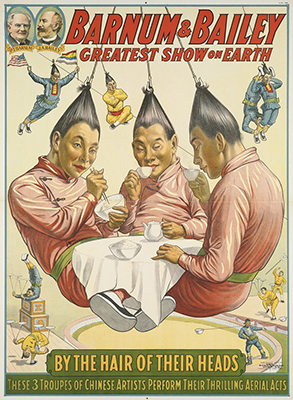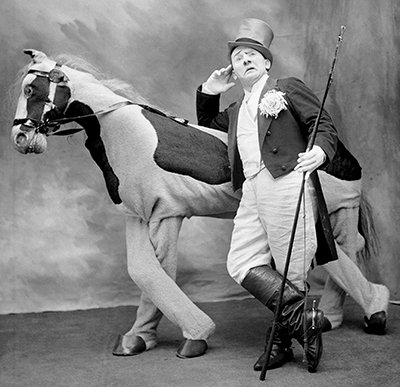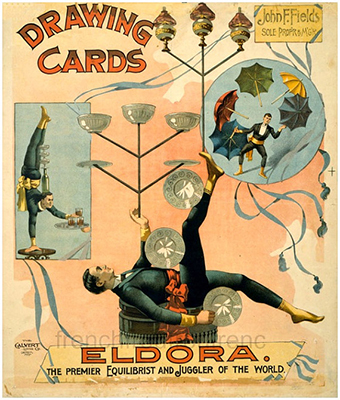
advance man |
|
|||||||||||||||
aerialist |
||||||||||||||||
Auguste |
 A clown with a sad, bumbling persona. ‘Auguste’ is French for idiot. The crowd in a Paris cirque shouted "Auguste!" at an equestrian who decided to change to clowning after he showed up drunk one night and accidently put on a funny show. A clown with a sad, bumbling persona. ‘Auguste’ is French for idiot. The crowd in a Paris cirque shouted "Auguste!" at an equestrian who decided to change to clowning after he showed up drunk one night and accidently put on a funny show. |
|||||||||||||||
automata or autotrons |
||||||||||||||||
bally, bally act, or ballyhoo |
||||||||||||||||
barker |
 A man who stands outside, especially at the sideshow, and encourages people to “come on in...” for a small fee, of course. A man who stands outside, especially at the sideshow, and encourages people to “come on in...” for a small fee, of course. |
|||||||||||||||
benders |
1905.jpg) Contortionists, also called posturers, India-rubber men, incomprehensibles, or nondescripts. Contortionists, also called posturers, India-rubber men, incomprehensibles, or nondescripts. |
|||||||||||||||
Big Bertha |
||||||||||||||||
big top |
||||||||||||||||
brass and art |
||||||||||||||||
cackler |
||||||||||||||||
calliope |
 A "steam piano," often pulled in parades by horses with plumes. It can be heard a mile away. A "steam piano," often pulled in parades by horses with plumes. It can be heard a mile away. |
|||||||||||||||
cameleopard |
 The mysterious, thought to be mythical, beast that we now know as a giraffe. The mysterious, thought to be mythical, beast that we now know as a giraffe. |
|||||||||||||||
candy butcher |
 Concessions hawker. Concessions hawker. |
|||||||||||||||
clown alley |
 The clowns get their own dressing tent because their make-up and costume changes are so extensive. It's the closest tent to the big top as clowns go in and out constantly. The clowns get their own dressing tent because their make-up and costume changes are so extensive. It's the closest tent to the big top as clowns go in and out constantly. |
|||||||||||||||
daredevil |
||||||||||||||||
disaster march |
 The Sousa march Stars and Stripes Forever was played when a fire, stampede, or other catastrophe began. All circus hands rushed to the scene. The Sousa march Stars and Stripes Forever was played when a fire, stampede, or other catastrophe began. All circus hands rushed to the scene. |
|||||||||||||||
entreé |
||||||||||||||||
equestrian |
||||||||||||||||
first of May |
||||||||||||||||
flier and catcher |
 Two of the three performers on the flying trapeze. The third, who sends out the trapeze timed so that the flier can return, doesn't seem to have a title. Two of the three performers on the flying trapeze. The third, who sends out the trapeze timed so that the flier can return, doesn't seem to have a title. |
|||||||||||||||
freak |
||||||||||||||||
gaff |
||||||||||||||||
hair hanging |
 Just what it sounds like, an act performed in the air by a woman or man who is suspended by a gizmo tied up in his or her hair. The thought makes my scalp itch. Just what it sounds like, an act performed in the air by a woman or man who is suspended by a gizmo tied up in his or her hair. The thought makes my scalp itch. |
|||||||||||||||
hatching |
||||||||||||||||
hippodrome |
 The track around the rings, where the spec takes place. Clowns and dancing girls often work in the hippodrome, and sometimes there are races. The track around the rings, where the spec takes place. Clowns and dancing girls often work in the hippodrome, and sometimes there are races. |
|||||||||||||||
hold your horses |
||||||||||||||||
humbug |
||||||||||||||||
illustrated man or woman |
 One covered in tattoos. One covered in tattoos. |
|||||||||||||||
iron jaw |
 An aerial act in which a woman, often wearing wings, puts a bit in her mouth and is raised high where she swings or spins depending on the bit. The act is also called a Human Butterfly. An aerial act in which a woman, often wearing wings, puts a bit in her mouth and is raised high where she swings or spins depending on the bit. The act is also called a Human Butterfly. |
|||||||||||||||
jargo |
 Clown act in animal costume. Clown act in animal costume. |
|||||||||||||||
Jumbo |
 The name given to one very large elephant. Jumbo is the Swahili word for chief. The name given to one very large elephant. Jumbo is the Swahili word for chief. Jumbo the elephant was so famous that his name became an adjective. |
|||||||||||||||
kinker or kinko |
||||||||||||||||
leotard |
|
|||||||||||||||
liberty act |
 A horse act, classically eight white, or black and white, Arabians. The horses in a liberty act are free, untethered, doing a set of steps as directed by voice and hand gestures. Herd instincts help this happen. A horse act, classically eight white, or black and white, Arabians. The horses in a liberty act are free, untethered, doing a set of steps as directed by voice and hand gestures. Herd instincts help this happen.
A liberty act can be dangerous if the horses become panicked. |
|||||||||||||||
long mount |
 Elephants lined up, each with her forelegs on the elephant in front of her. (Elephants were generally referred to as bulls but most were female as males were harder to handle.) Elephants lined up, each with her forelegs on the elephant in front of her. (Elephants were generally referred to as bulls but most were female as males were harder to handle.) |
|||||||||||||||
make the nut |
||||||||||||||||
making canvas |
||||||||||||||||
menagerie |
||||||||||||||||
midway |
 The area between the entrance and the big top, containing shows, concessions, and sometimes rides. The area between the entrance and the big top, containing shows, concessions, and sometimes rides. |
|||||||||||||||
outside |
||||||||||||||||
pillar, or three man column |
 An act where men stand on each other's shoulders. There are many variations. An act where men stand on each other's shoulders. There are many variations. |
|||||||||||||||
pinheads |
||||||||||||||||
prodigies |
 Sideshow artists, their preferred description. Sideshow artists, their preferred description.
Do not call them the F word. |
|||||||||||||||
props |
||||||||||||||||
rain or shine |
||||||||||||||||
ringmaster |
 And yet another word born in the circus. And yet another word born in the circus. |
|||||||||||||||
red light |
||||||||||||||||
Risley act |
 An act like that of Richard Risley Carlisle, who lay on his back and juggled his partner on his feet. He did this in Japan in the first Western circus to visit the nation. The Japanese then took Risley acts to new levels. An act like that of Richard Risley Carlisle, who lay on his back and juggled his partner on his feet. He did this in Japan in the first Western circus to visit the nation. The Japanese then took Risley acts to new levels. |
|||||||||||||||
Roman rings |
||||||||||||||||
ropedancer |
 Someone who walks on a rope. AKA ropewalker.
A wirewalker walks on a cable. The ropes and wires may be slack or tight depending on the act being performed. Some artists also walk up rigging in or outside of the big top. Someone who walks on a rope. AKA ropewalker.
A wirewalker walks on a cable. The ropes and wires may be slack or tight depending on the act being performed. Some artists also walk up rigging in or outside of the big top. |
|||||||||||||||
roustabouts |
 Workers who raise and lower the tents and pack and unpack everything from the trains. Roustabouts traditionally were often black, as black men had trouble finding other work. Workers who raise and lower the tents and pack and unpack everything from the trains. Roustabouts traditionally were often black, as black men had trouble finding other work. |
|||||||||||||||
rube |
||||||||||||||||
sheeted up |
 Describes a town that has been covered in circus posters prior to the opening day. Describes a town that has been covered in circus posters prior to the opening day. |
|||||||||||||||
Siamese twins |
 Conjoined twins got this label because the first famous pair were Chang and Eng Bunker who were born in Thailand, called Siam until 1939. Conjoined twins got this label because the first famous pair were Chang and Eng Bunker who were born in Thailand, called Siam until 1939.Chang and Eng were joined at the lower chest. They quarreled often but married sisters and fathered 22 children. They were rich and respected. |
|||||||||||||||
spec or spectacle |
 A richly costumed parade around the hippodrome track inside the big tent or arena. The spec opens the show. A richly costumed parade around the hippodrome track inside the big tent or arena. The spec opens the show.
|
|||||||||||||||
 Specs often have themes such as battles, coronations, Bible stories, or fairy tales. The costumes are more flamboyant than historically accurate: they start with history but add contemporary elements and bling, and show lots of legs.
|
||||||||||||||||
star |
||||||||||||||||
ten-in-one (10-in-1) |
 A sideshow tent with many acts. A sideshow tent with many acts. |
|||||||||||||||
throw your hat in the ring |
||||||||||||||||
towners |
||||||||||||||||
walk around |
 Clowns doing shtick in the hippodrome
to entertain the audience while the Clowns doing shtick in the hippodrome
to entertain the audience while the equipment for acts in the rings is being set up.
|
|||||||||||||||
whiteface |
 Classic clown based on Pierrot, generally wearing a ruff and little cap, with a gentle and optimistic persona. Classic clown based on Pierrot, generally wearing a ruff and little cap, with a gentle and optimistic persona. |
 |
||||||||||||||
with it |
||||||||||||||||
|
||||||||||||||||

